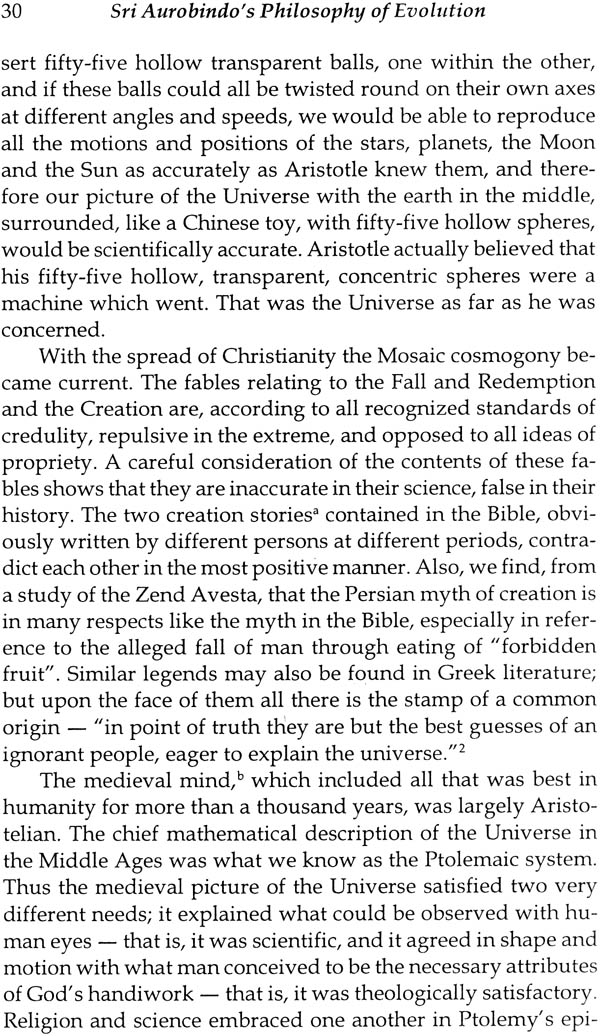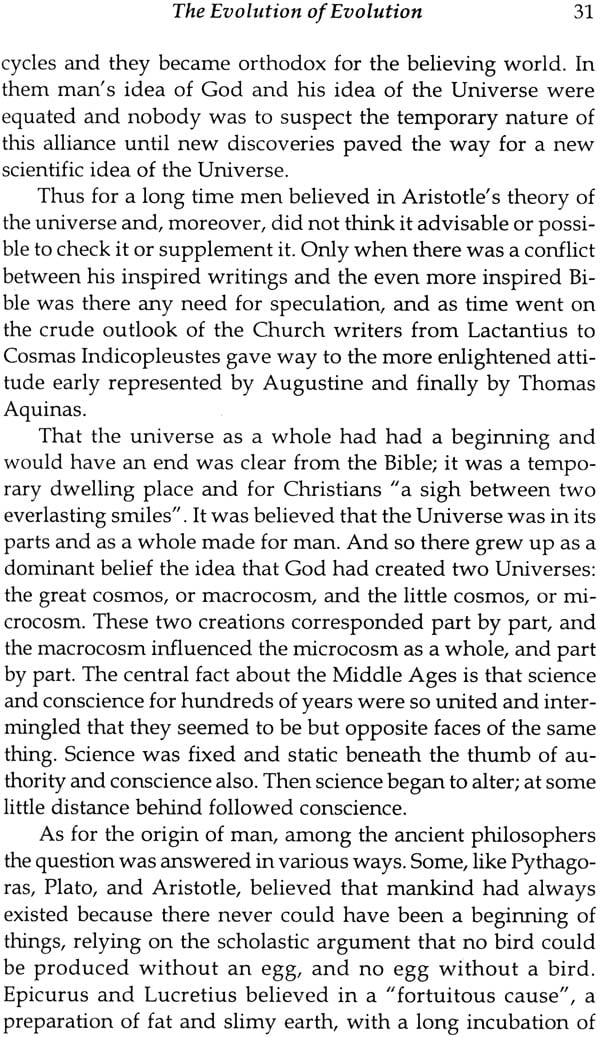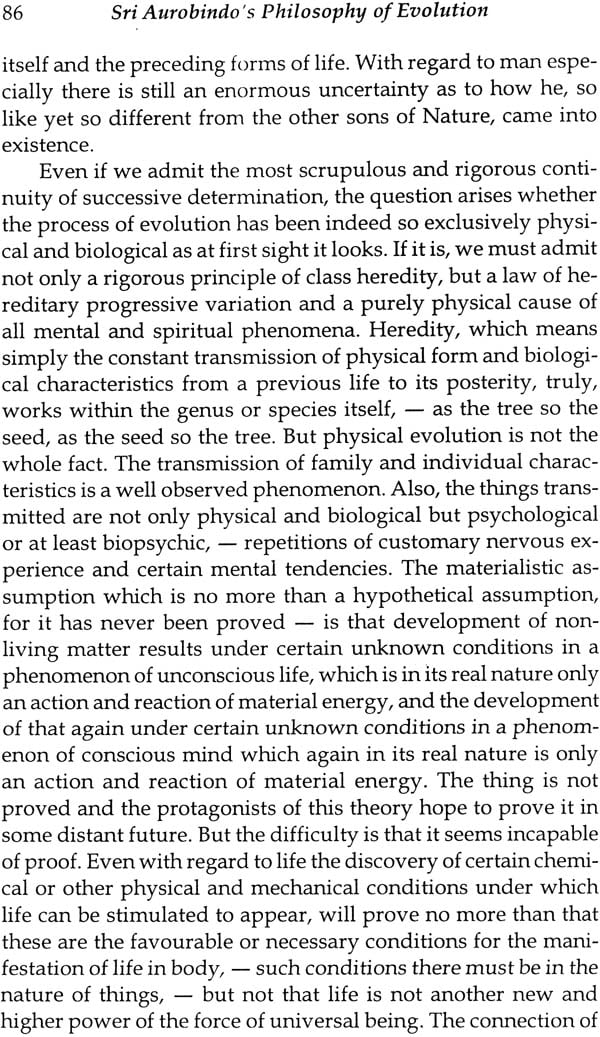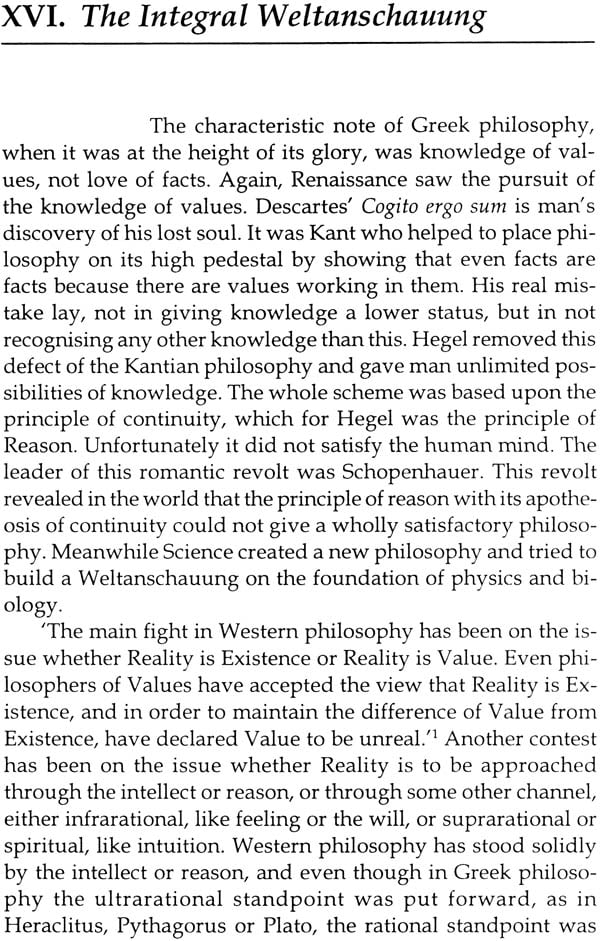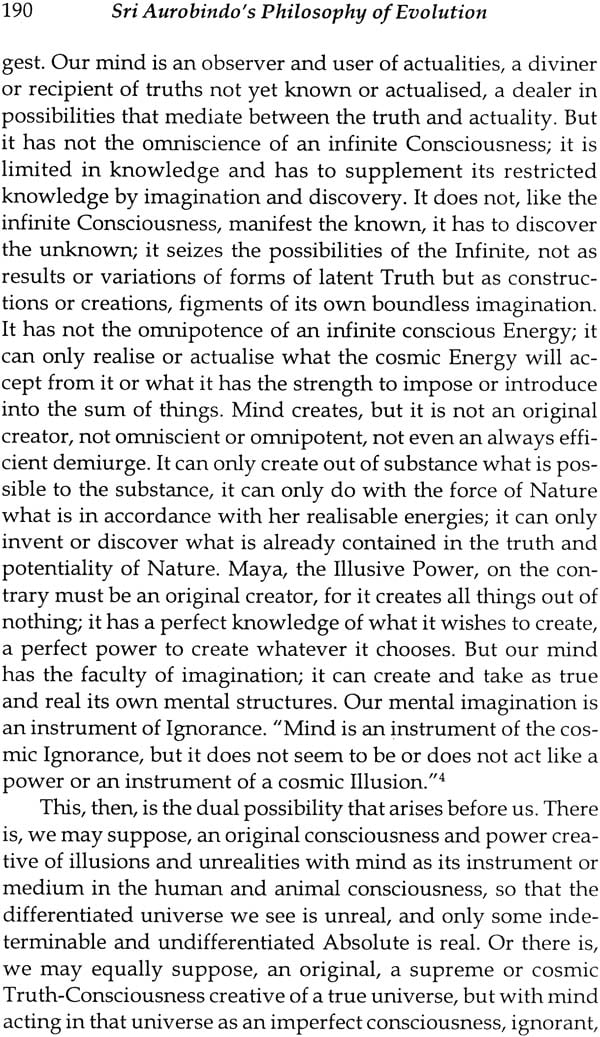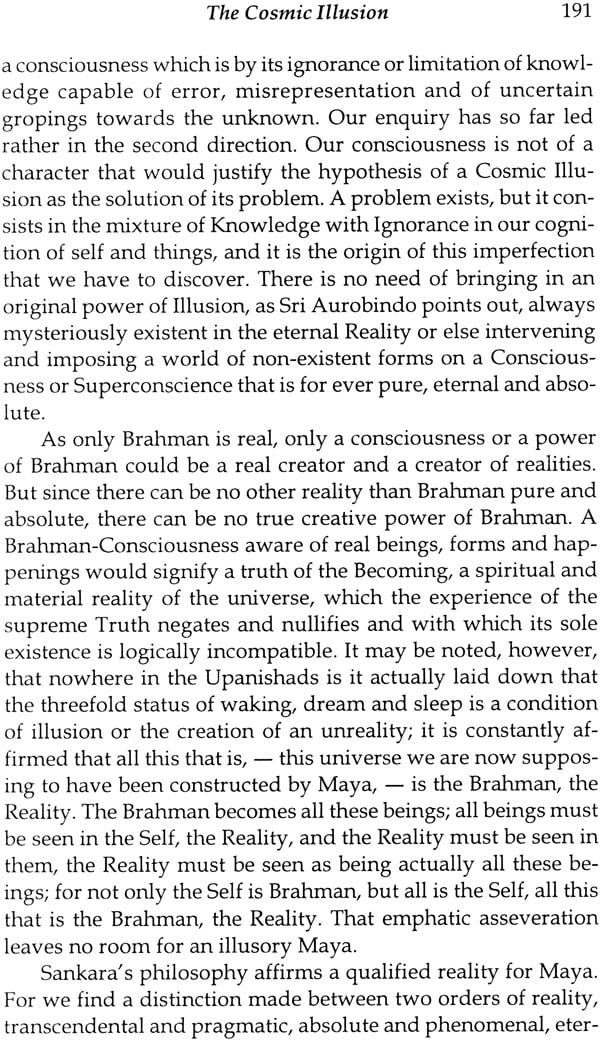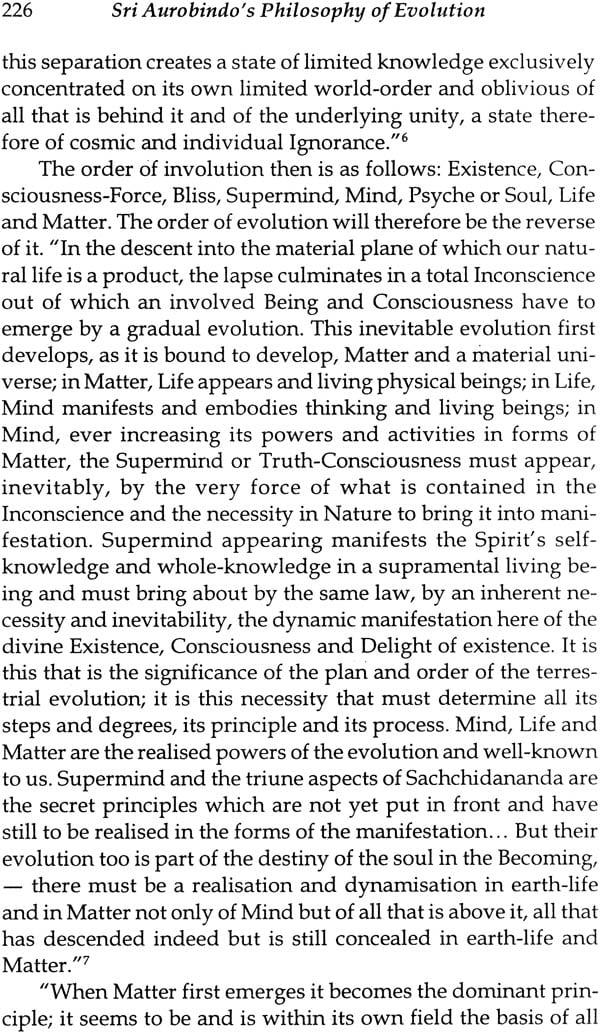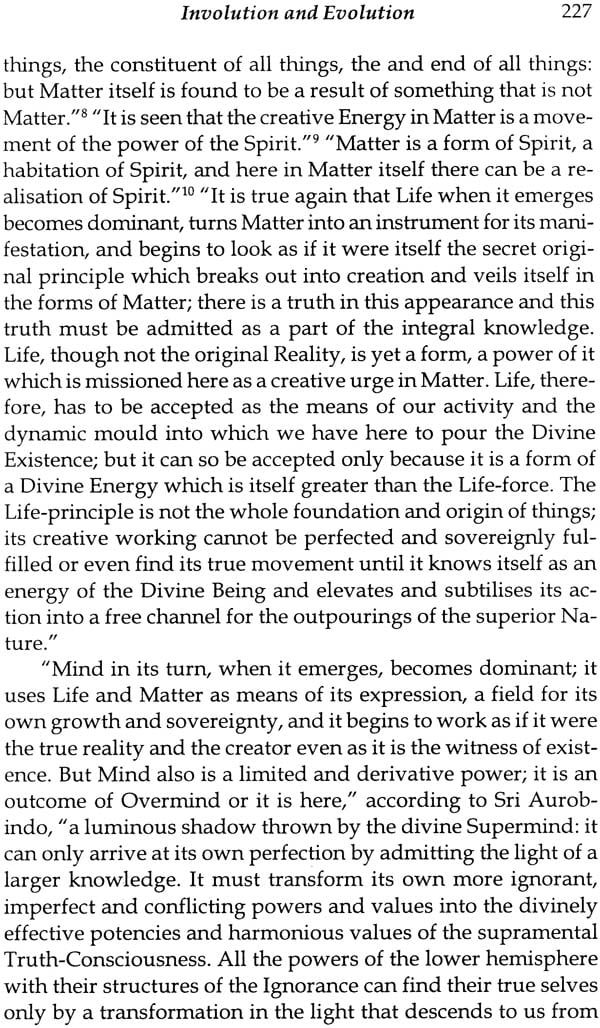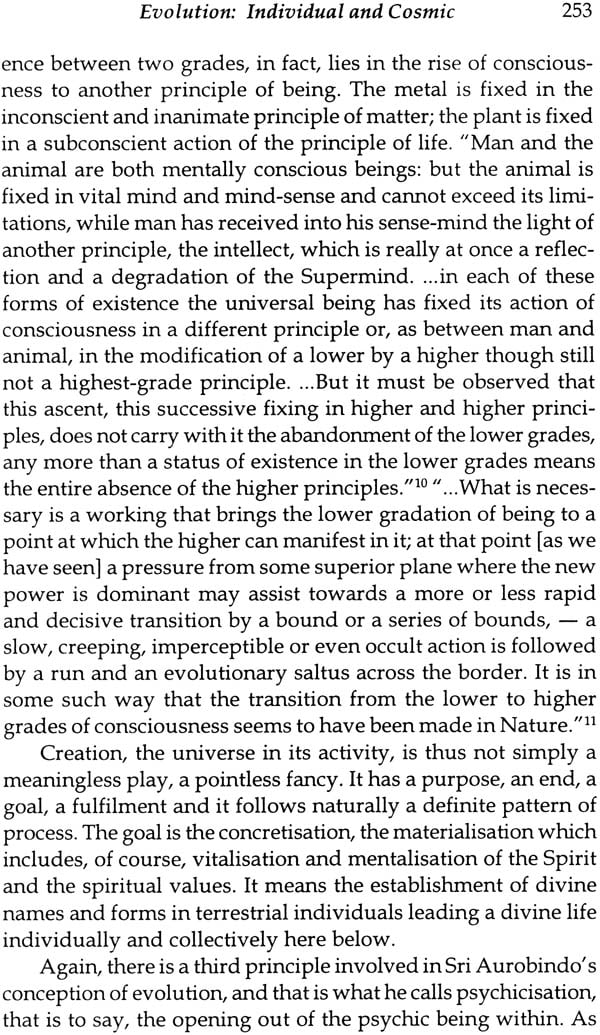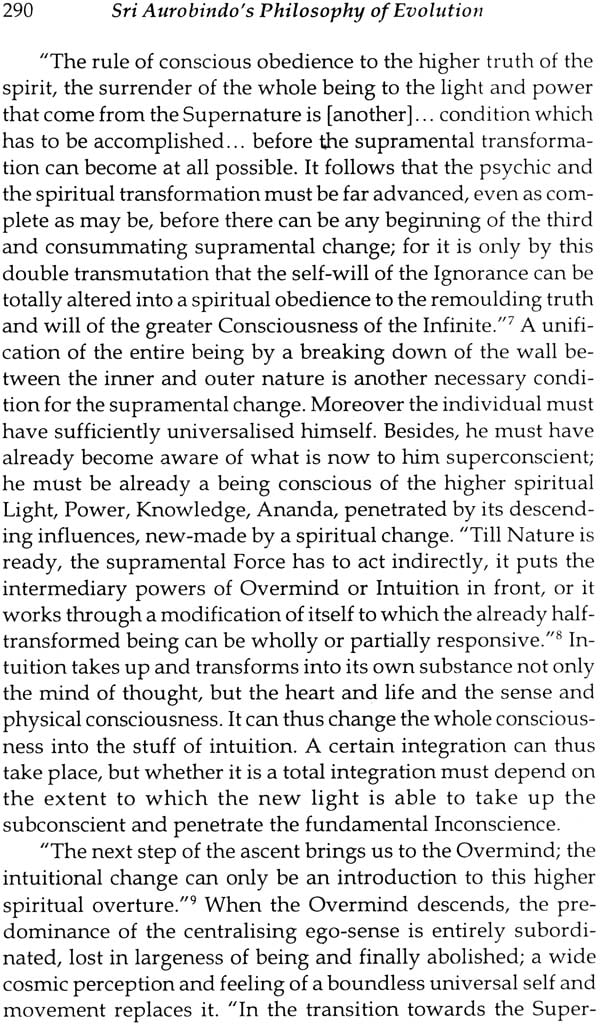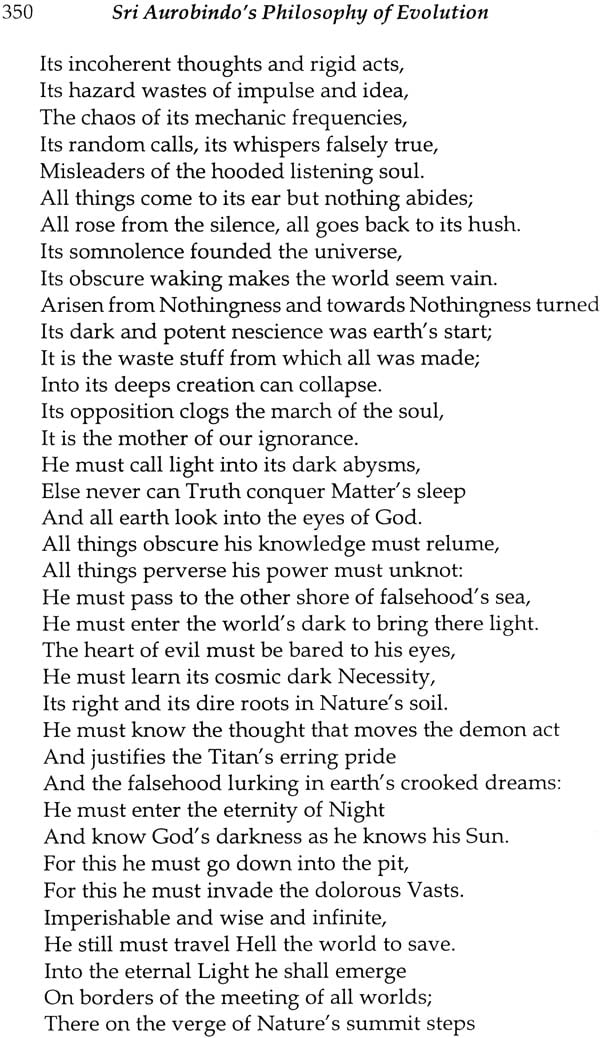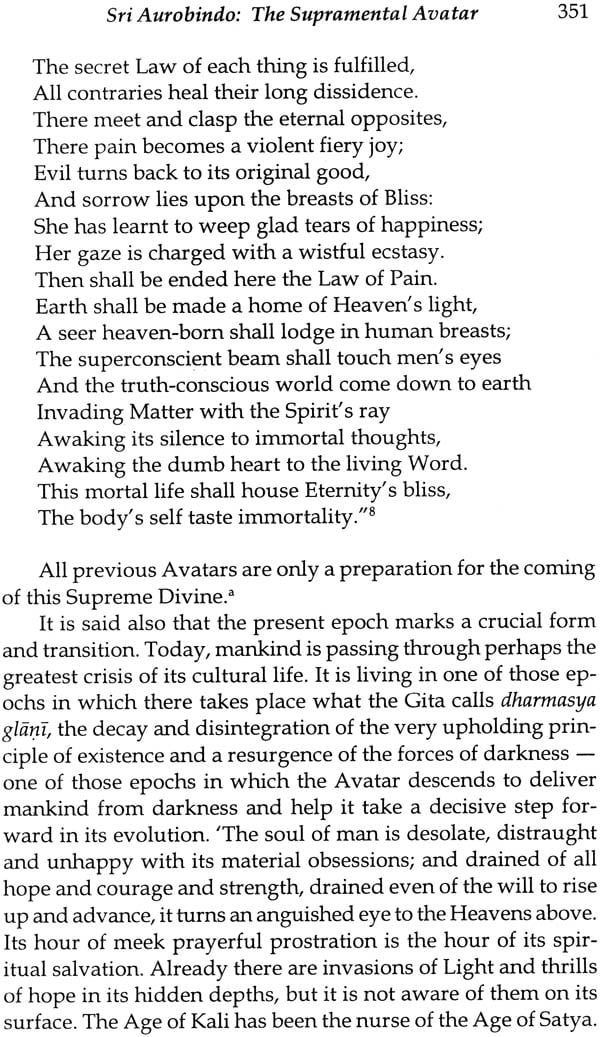
Sri Aurobindo's Philosophy of Evolution
Book Specification
| Item Code: | NAK727 |
| Author: | V. Madhusudan Reddy |
| Publisher: | Sri Aurobindo Ashram, Pondicherry |
| Language: | English |
| Edition: | 2004 |
| ISBN: | 9788185853116 |
| Pages: | 391 |
| Cover: | Paperback |
| Other Details | 8.5 inch X 5.5 inch |
| Weight | 550 gm |
Book Description
Eminent scholar in ancient India thought and the philosophy of Sri Aurobindo, and Chaiman of the Institute of Human Study, Hyderabad, the late prof. V. Madhusudan Reddy distinguished himself by a life of complete dedication to the vision of Sri Aurobindo. An exceptionally gifted luminous mind and an idealist who founded and steered many institutions, Prof. Reddy would be remembered for his varied attempts to disseminate the vision of a New World as envisaged by Sri Aurobindo.
Prof. V Madhusudan Reddy was distinguished scholar who excelled in works like Integral Yoga Psychology, Meta-History. The Vedic Epiphany and Savitri. He published more than two hundred research papers on literature, philosophy and spirituality and about twenty books on the philosophy and vision of Sri Aurobindo. He travelled extensively on prestigious international fellowship such as the UNESCO and the Fulbright to leading centres of learning in the East and the West.
He has the first Darshan of Sri Aurobindo and the Mother in 1949, an event that was a turning point in his life. Since then philosophy was not just an intellectual proposition for Prof. Reddy but an approach to the Divine.
It is a pleasure to write these few lines by way of a foreword to this thesis by Dr. Madhusudan Reddy on the concept of evolution in the philosophy of Sri Aurobindo and the problem of human destiny. Dr. Madhusudan Reddy published his 'Sapphires' of song a few years ago and I was glad to write about them, being a rhymester myself. But layman as I am, I hesitate to speak about a learned philosophical thesis.
For Sri Aurobindo has been to me a force transforming the lives of countless individuals rather than a philosopher who has his place on the bookshelves in university libraries. He wrote out of the fullness of life and vision and he promotes in the reader a new perspective, a new approach to life. In a sense, as almost everyone knows, this is also the major point of difference between eastern and western philosophy. The eastern philosopher builds his philosophy on the basis of his yogic experience casually while speaking about his experience and vision. For the westerner, philosophy is a speculative adventure, not necessarily related to other aspects of his being or consciousness. It is only recently that the intuitive utterances of gifted men of vision like Coleridge and Keats are being studied with an eye on the philosophic system which might be erected on the basis of these utterances.
Though Sri Aurobindo was not a regular philosopher in the western sense, he had the necessary equipment to present his philosophy in a systematic manner, a manner quite acceptable to students of philosophy. This will be apparent if we compare his Letters with his The Life Divine. His Letters are full of flashes of intuition and they reveal Sri Aurobindo as a seer who expresses himself in the manner of Coleridge and Keats. But The Life Divine is a philosophical thesis which is revelatory in its substance and technical in its presentation. The poet in Sri Aurobindo lends magnificence and grandeur to its style. But the philosopher in him also builds up a logical system of thought which has a marvellous consistency and also transparency to the vision which begot it and which animates it.
Dr. Madhusudan Reddy is peculiarly qualified to write about Sri Aurobindo's philosophy. His affiliations to Sri Aurobindo figure first on the human plane of sadhana, of transformation. But he is also a brilliant student and teacher of philosophy and so he is equipped to tackle Sri Aurobindo's thought on the side of technical presentation as well. He further brings a background of philosophic knowledge to his study of Sri Aurobindo which illuminates his interpretation of Sri Aurobindo's thought in a number of ways. This will be clear to anyone who reads in the first part of his thesis chapters like Vedic and Puranic Cosmogony, The Evolution of Evolution, The Mysticism of Matter, The Limitations of Science and so on. We have here a quintessential survey of practically the whole range of western philosophy and also of the thought of distinguished physicists and biologists who write about the philosophic implications of their subject. It is against this rich and varied back- ground that Sri Aurobindo's original view of life and the universe is presented in a lucid manner.
It is his twofold equipment as aspirant and student that gives its special flavour to Dr. Reddy's thesis on Sri Aurobindo. This also enables him to approach the history of philosophy itself synthetically, digging out from it jewels that blaze the Sri Aurobindonean path. The student who accepts Sri Aurobindo finds here an account of the gropings and anticipations that culminate in the Sri Aurobindonean blaze of glory. The student who has an open mind will make himself familiar here with a consistent account of evolution that is built around the twin poles of Spirit and Matter.
I congratulate sincerely Dr. Madhusudan Reddy who has done this valuable service to students of philosophy all over the world.
Many post-graduate dissertations have been attempted in India and abroad on various aspects of Sri Aurobindo's philosophy. It is a happy sign that Sri Aurobindo is slowly but increasingly coming to occupy his place among contemporary thinkers and creators. The central ideas contained in his versatile contribution are new and stimulating. As the late Dr. S. K. Maitra rightly observes: "System-building is not what we value in a philosopher. It is the power to kindle thought, to give a new orientation, a new outlook." Sri Aurobindo's ideas on various aspects of human culture act as enkindlers of the growing intellect. It is not surprising that Dr. V. Madhusudan Reddy is attracted by his outlook.
But all students of philosophy today do not fall - like the ancient Indian or Greek disciples - in the same class. Among students of philosophy there are various types. Some are professionals who live in some old and traditional mould and whom no philosophy ever touches. There are others who are careerists and have an eye on position and promotion. Others are interested in ideas - new and original, and some are attracted by the method and style. There are very few who can be considered as earnest seekers of the truth, prepared to tread the unknown path and risk the dangers of an adventure and acquire wisdom. This thesis, I believe, differs from many others. Dr. Reddy may be said to belong to the last category of students of philosophy. The thesis breathes an air of conviction and is not merely a dry and intellectual presentation.
It should be borne in mind that philosophy -like psychology - today is divided into many mutually contradictory schools with different aims. The main bulk of European thought influenced largely by the domination of Science has been critical and has tended more and more to narrow down the field of human experience to sensation, bringing it nearer to physical science. Mathematical abstraction is the method adopted by some. Some schools that have been influenced by World- War II have stressed the importance of the present to the exclusion of any future destiny. They fall almost into the Buddhistic thought of the impermanence of the individual - if not his total non-existence. They do not seem to believe in values, the highest according to them, is "Being" or existence - direct experience of things. These attempts have yielded good results in many ways: philosophical thinking is obliged to keep its feet on earth and men have been made to feel the need of connecting the present time with the ultimate destiny of man. But one has to admit the truth of the following statement by Dr. R. G. H. Sin, the Technical Director of the Institute at Harvard: "Dejectedly we read the account of the invitation of the Rockefeller Foundation to the American Philosophical Society after World-War II 'to undertake an examination of the present state of philosophy and the role philosophy might play in the post-war world."' In creditable frankness, the Commit- tee of the Society says in the Introduction of the Report: There is not in our contemporary situation an authoritatively accepted body of doctrine called 'Philosophy' for which duly accredited spokesmen can pretend to speak. There are philosophies and philosophers, and they differ philosophically on just the issues with which we are called upon to deal. Sri Aurobindo is a creative philosopher in whom as Dr. S. K. Maitra has shown the East and the West meet. This grand synthesis not only gives a new interpretation of evolution, but stresses the possibility,-nay, the inevitability of man's ascent to a higher consciousness beyond Mind, - the Supermind, and the need of bringing it down in life so as to radically transform human nature. Sri Aurobindo shows in his inspired vision that the change needed is not a mere political, economic or social change. The change required is psychological, an inner change. He is the first to point out that this inner change does not consist in embodying ethical values in life. Ethical values are a stage, an important step in the direction of the required inner change. But they are not the end. It is an entire change of consciousness, a transformation of man's nature, which can only be brought about by the descent of the Higher Power into the mental consciousness of man.
The feeling that a great change is necessary is fairly wide- spread among the intelligentsia everywhere. Material advance itself, man's mastery over unlimited material energy and this simultaneous feeling of the need for an inner change are signs of the descent of a Power beyond mind in the earth-evolution. The process of evolution has proceeded from Matter to Life, from Life to Mind. Man, the mental being, is transitional be- cause he has yet to ascend to a Higher Consciousness beyond Mind. This is the great spiritual Odyssey that man has to undertake consciously.
Sri Aurobindo not only shows the need of going beyond the mental consciousness but has laid down a line of inner discipline by which one can attempt to open to the Higher Consciousness and bring it down in life. This effort of bringing down a new Power to act in the earth-consciousness is a distinctive and practical contribution by Sri Aurobindo to human evolution. If material science lays open before man a wide, and practically unlimited field of adventure, research and experience, the Higher Consciousness has unexplored heights where lie inexhaustible treasures of Light and Power which can effectively help mankind to solve its problems. Sri Aurobindo stated:
"There is also a spiritual dynamic power which can be possessed by those who are advanced in spiritual consciousness,. and this Power is greater than any other and more effective. It was this force which Sri Aurobindo used at first only in a limited field of personal work, but afterwards in a constant action upon the world-forces."
While showing the need for the ascent to a Higher Consciousness beyond Mind, Sri Aurobindo has pointed out the limitations of reason as a faculty for acquiring knowledge and mastering life. Dr. Reddy in his First Thoughts amplifies Sri Aurobindo's stand vis-a-vis reason. The chapter, Logic of Solids discusses almost all classical and contemporary views on the subject.
Dr. Reddy has boldly brought in two typically Eastern - I may say, Indian - ideas in his thesis, - those of rebirth and incarnation.
There is a growing body of men all over the world that is seeking the new Light and many have found it in the new vision which Sri Aurobindo has brought to the earth-consciousness. His great effort to build a new mould of collective life round the central spiritual Truth has attracted the attention of many leaders and thinkers.
It is these considerations - apart from metaphysical ones - that seem to have convinced Dr. Reddy that Sri Aurobindo is the Supramental Avatar. An Avatar comes to show the way out of a crisis by accepting the limitations and difficulties of evolutionary human nature. In that sense Sri Aurobindo is an Avatar. This is what he wrote in a letter to a disciple: II As for the Mother and myself, we have had to try all ways, follow all methods, to surmount mountains of difficulties, a far heavier burden to bear than you or anybody else in the Ashram or outside, far more difficult conditions, battles to fight, wounds to endure, ways to cleave through impenetrable morass and desert and forest, hostile masses to conquer - a work such as, I am certain, none else had to do before us. For the Leader of the Way in a work like ours has not only to bring down and represent and embody the Divine, but to represent too the ascending element in humanity and to bear the burden of humanity to the full and experience, not in a mere play or Lila but in grim earnest, all the obstruction, difficulty, opposition, baffled and hampered and only slowly victorious labour which are possible on the Path."! It is true that vast and unprecedented forces, far more than at any other time in human history, are now in motion. The psychological crisis, which had been gathering force for nearly two centuries, and of which the two World-Wars were symptoms, is being resolved: the unity of mankind is already in sight. Many remedies are being tried; each sincere effort makes its contribution to the solution of the problem. There are educational, economic and cultural efforts. There are scientific efforts to master the secrets of Nature and conquer space. Idealistic and ethical values have already entered the field of politics which was the close preserve of collective self-interest and ambition. But the crux of the matter, I may repeat, is the change in human nature. That radical change required for bringing the Kingdom of Heaven upon earth is not an ethical change but a psychological one - a radical reorganisation of man's nature. That can come about only by a Power that is attainable by man if he makes a sincere effort. Sri Aurobindo is the Incarnation of this Power and Light in our age.
Sri Aurobindo's philosophy is a new and creative synthesis which holds together and reconciles many contradictions. The logic of the Infinite and the logic of finitude appear in it side by side. It is difficult to write about a philosophy of this kind without sacrificing its subtlety and its fineness. What little I have been able to do in the matter has been possible only because of the Blessings of the Mother of Sri Aurobindo Ashram, Pondicherry.
Of the many persistent problems of philosophy that of 'Evolution and Human Destiny' is a uniquely intriguing one. In relation to the universe around him man has been variously considered as the fore-runner of biological evolution, as the centre of reference for all that is created - the measure of all things, as a living laboratory of values and as the nucleus of social transformation. Philosophy and Science have vied with each other in the last few decades, to give a cogent account of Evolution. In the plethora of metaphysical systems, scientific theories and religious beliefs which have accumulated around the problem nothing seems to be more convincing than the conviction, common to all, in the immense potentialities of man. No doubt all these have greatly contributed to the sum total of the understanding of man and his hidden possibilities. But the basic truth about him, his evolution and his destiny, seems to escape the attention of many modern thinkers.
Man is a centre of the consciousness and power of the Infinite. He is a pilgrim of the Eternal and carries within him the sanction and the presence of the Divine. From man, the solitary animal, to our ideal of a world union the race has covered several stages - the family, the clan, the tribe, the community and the nation. Humanity has been struggling through the ages to manifest the different aspects of the cosmic Purusha. The saga of man's intense aspiration to surpass himself has been a conscious and deliberate process. It is the destiny of man to rise to yet higher heights of consciousness and evolve into a perfected and divinised superman. A great destiny certainly awaits him.
It is only in recent times that philosophers and scientists have begun addressing themselves seriously to this problem of Evolution. I have endeavoured in this thesis to weave together the insights of several philosophers scattered throughout the literature available on the subject, scanty though it is. Any restatement of Sri Aurobindo's philosophy involves an employment of the very words and phrases that he used for unfolding it. One can learn only through hard effort how difficult it is to sum up Sri Aurobindo in words other than his own. In the writing of this thesis I had the singular good fortune of having the advice and guidance of Sri Nolini Kanta Gupta, a life-long associate and disciple of Sri Aurobindo. I am deeply grateful to him for all his help and sympathy. I must also express my heart-felt thanks to the late Sri A.B. Purani, one of the earliest disciples of Sri Aurobindo and an authentic exponent of his teachings, for his valuable help and for writing the Introduction to this volume.
This book is essentially the thesis submitted by me in December, 1957 to Osmania University for the Degree of Ph.D. I am grateful to the Osmania University which has kindly sponsored its publication and to the University Grants Commission for providing the necessary funds. I am deeply indebted to Dr. D. S. Reddi, Vice-Chancellor, Osmania University, for his generous help and encouragement.
My grateful thanks are due to Prof. V. K. Gokak for his keen interest in the publication of this volume and for the Foreword that he has written to this book. I am most thankful to Dr. S. Vahiduddin and Sri Shiva Mohan Lal under whose guidance and supervision this thesis was written.
| Foreword | viii | |
| Introduction | x | |
| Preface | xv | |
| First Thoughts | ||
| I | Vedic and Puranic cosmogony | 3 |
| II | Avatarhood: The Parable of Evolution | 24 |
| III | The Evolution of Evolution | 28 |
| IV | Man Must Needs Have a Cosmology | 35 |
| V | The Mysticism of Matter | 44 |
| VI | Evolution of Homo Sapiens | 50 |
| VII | A Critical Restrospect | 59 |
| VII | Will To Reason | 69 |
| IX | The Limitations of Science | 75 |
| X | Ekam Bijam Bahudha Sakti-Yogat | 84 |
| XI | Annam Brahmeti Vyajanat | 89 |
| XII | The Metaphysics of Space and Time | 99 |
| XIII | The Philosophy of Change | 108 |
| XIV | The Nisus of Evolution | 118 |
| XV | The Logic of Solids | 127 |
| XVI | The Integral Weltanschauung | 144 |
| Movement One | Omnipresent Reality | |
| XVII | Impressions of the Infinite | 167 |
| XVIII | The Cosmic Illusion | 184 |
| XIX | Supermind and the Integral Knowledge | 194 |
| XX | The Ego and the Psychic | 204 |
| Movement Two | The Evolutionary Process | |
| XXI | Involution and Evolution | 219 |
| XXII | Modes of Manifestation | 230 |
| XXIII | The Apocalypse of Aspiration | 239 |
| XIV | Evolution Individual and Cosmic | 246 |
| Movement Three | The Spiritual Evolution | |
| XXV | Man and the Evolution | 259 |
| XXVI | The Purpose and Process of Rebirth | 269 |
| XXVII | The Tripple Transformaton | 280 |
| XXVIII | The Flaming Vision | 288 |
| Movement Four | Human Destiny | |
| XXIX | The Spiritual Aim | 301 |
| XXX | The New Humanity | 314 |
| XXXI | The Kingdom of Heaven | 326 |
| XXXII | Sri Aurobindo: The Supermental Avatar | 343 |
| References | 359 |
